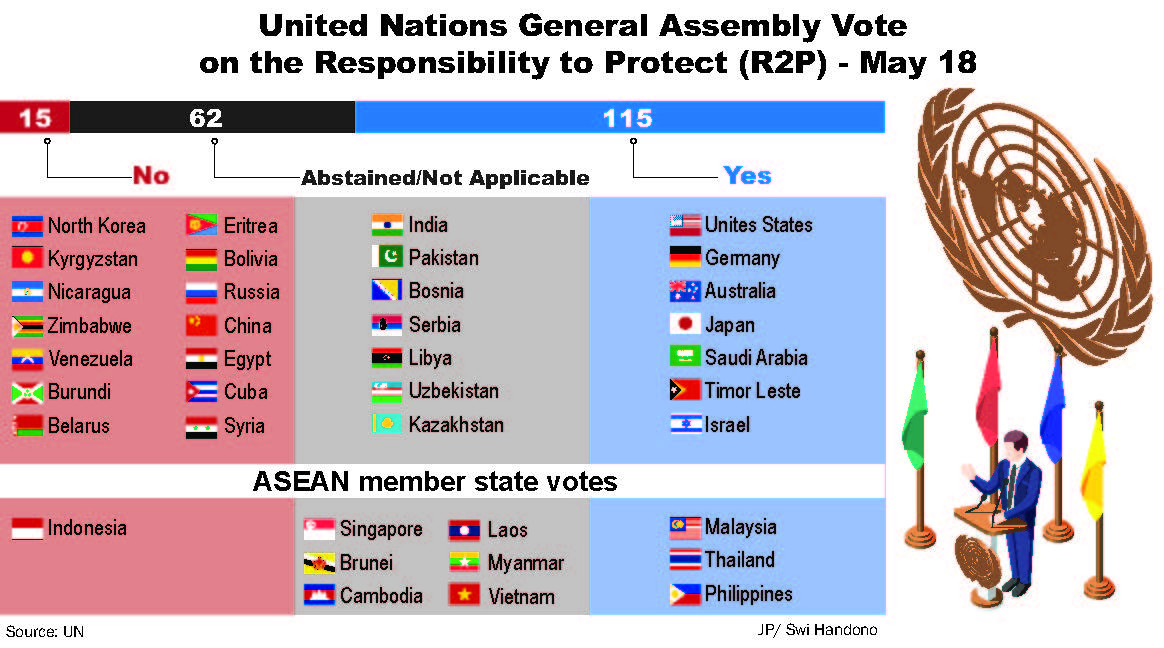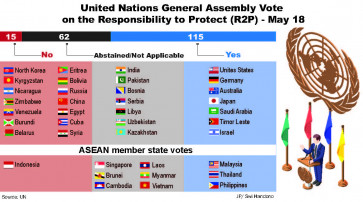Popular Reads
Top Results
Can't find what you're looking for?
View all search resultsPopular Reads
Top Results
Can't find what you're looking for?
View all search resultsIndonesia and R2P: Why so paranoid?
Indonesia’s choice to vote against the United Nations General Assembly resolution on the responsibility to protect is shocking especially because it has claimed to promote human rights in Southeast Asia, as well as in the world. Indonesia was the one that pushed hard for the protection of human rights to be included in the ASEAN Charter back in 2007.
Change text size
Gift Premium Articles
to Anyone
I
n its 75th Annual Session on May 18, the United Nations General Assembly voted to adopt Resolution A/75/L.82 on the responsibility to protect (R2P) and the prevention of genocide, war crimes, ethnic cleansing and crimes against humanity.
The resolution basically decides to include the item on R2P in the UN annual agenda and to request the UN secretary-general to report annually on the topic. This is the first resolution on R2P the UN has adopted, 12 years after the 2009 Resolution 63/308 that adopted the secretary-general report on implementing the R2P.
The result of the voting was split, with 115 states voting for, 62 abstaining and 15 voting against. While some states’ choices were well-predicted, it is very surprising and saddening to see Indonesia, among all the ASEAN member states, voting “no”.
Indonesia’s choice to vote against the resolution is shocking especially because it has claimed to promote human rights in Southeast Asia, as well as in the world. Indonesia was the one that pushed hard for the protection of human rights to be included in the ASEAN Charter back in 2007. Indonesia was also a strong advocate for the establishment of the ASEAN Intergovernmental Commission on Human Rights (AICHR), the first regional human rights body. Indonesia also showed a strong response to the persecution of the Rohingya ethnic minority in Myanmar.
Quite recently, Indonesia reacted against the Israeli attacks on Palestinians. To sum up, it is about the protection of the people that Indonesia has been championing to the world.
A Foreign Ministry spokesperson has asked the public not to view Indonesia’s decision as objecting to the substance of R2P; it is rather a disagreement as the resolution seeks to promote R2P as a permanent annual agenda in the General Assembly. Indonesia prefers to maintain the existing procedure according to the 2005 World Summit Outcome, where R2P is only regarded as a follow-up agenda.
While Indonesia’s argument can be partly true, the gesture to vote against the resolution unavoidably raised many eyebrows. Ultimately, it sends the message that Indonesia does not want R2P to be endorsed further amid growing crises in many parts of the world.


















